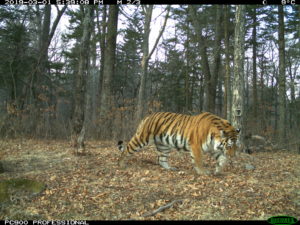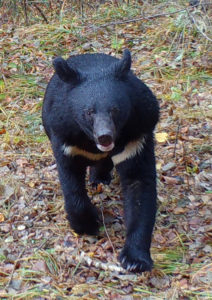In this second blog from WCS Russia, staff are finding the time to reminisce about big cat conservation. Here Aleksandr Rybin, of WCS Russia‘s Amur leopard project tells WildCats how one day, his curiosity nearly got the better of him.
As I sit in my Vladivostok apartment during the coronavirus pandemic, I’ve been yearning to return to the forest. This is an amazing time in Southwest Primorye, with rhododendrons soon blooming among the steep cliffs and long plateaus that define Amur leopard habitat. But since I cannot go there myself right now, I’ve been thinking of my past adventures.
For example, a few winters ago I was part of a team tracking a male tiger that had passed by a few days before. We followed its tracks in the snow, and noted from a distance that the tiger had approached a small cave in the cliffs, and based on the amount of tracks there, had apparently spent some time investigating before moving on. We decided to set a camera trap in case it or other animals returned to this potential den site.
As I approached the cave with camera trap in hand, I had another realization: perhaps there was something already IN the cave. As I hid behind a boulder, I looked over the situation carefully: the cave had a small opening about 40 cm tall and was situated on a very steep slope surrounded by sparse vegetation. There were no tracks in the snow except for the tiger. From the cover of the boulder, I shouted and clapped, hoping to arouse anything that might be sleeping inside. No response. Next, I threw a small stone into the cave. Nothing. So I moved closer, coming within a meter and a half, and crouched down to peer into the darkness. Only, I didn’t see darkness; instead I saw a white spot.
As it turned out, this spot was the white on the breast of an Asiatic black bear that, as I watched, opened its eyes, roared, and leapt out of the cave. I fell back in surprise, the white of the bear’s teeth just a meter away from me, then, already on the ground, rolled uncontrollably down the steep hill. The bear disappeared. I could hear a member of the team running toward me, shouting if I was ok, but I could not answer as the breath had been knocked out of me during my bumpy descent down the hill. In the end I dislocated two fingers and bruised my chest, but compared to what could have happened, I felt very, very lucky.
Back at camp, we realized that the tiger we were tracking had probably found the bear as we had, and probably had tried to extract and kill it. Consequently, the bear was not in a very charitable mood when I showed up a few days later and started throwing rocks at it.
In thinking back on this story, I count my blessings. Fieldwork in Southwest Primorye is fun, although my days of peeking into dark caves are now forever behind me. That particular curiosity has been forever satisfied.



